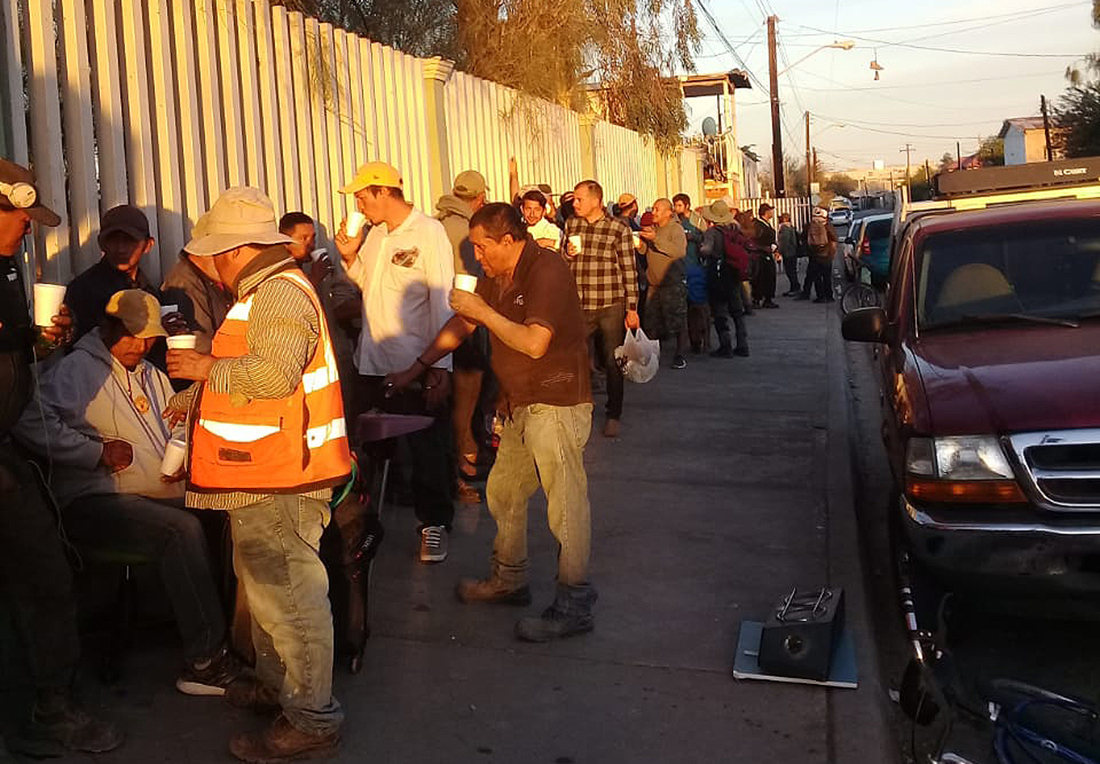
Migrants lining up for a meal at the Casa Betania center in Mexicali, Mexico.
In late June 2022, when I met with the Maryknoll lay missioners of the U.S.-Mexico border region, I was able to present a request from Rick Dixon to provide services at the border in Mexicali, Mexico. Rick had previously served for more than nine years as a Maryknoll lay missioner in El Salvador.
At the June meeting, the border region reviewed Maryknoll Lay Missioners’ presence at the border over the previous three years and made affirmations about their goals and objectives in continuing our work among migrants, refugees and asylum seekers at the border.
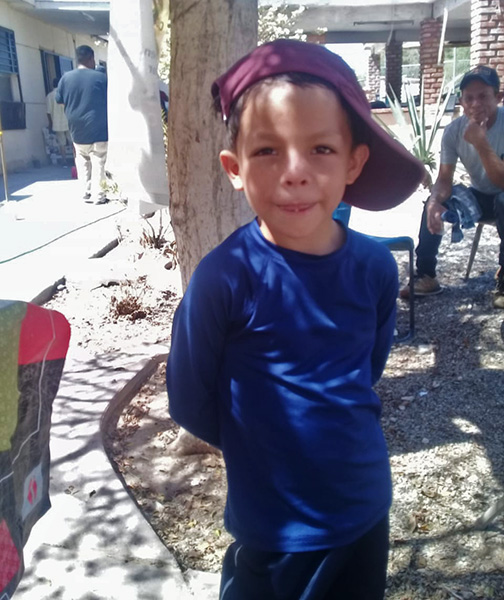
A 7-year-old Honduran boy at the San José Obrero center. His father is in the background.
The members of Maryknoll Lay Missioners’ border community agreed that Rick’s proposal to expand our border presence to Mexicali should be explored. They also stipulated that if the site was opened, the ministry should align with the priorities of the region and with the organization’s new focus on nonviolence.
We initiated communication between Rick, Maryknoll Lay Missioners and the director for migrants in the Diocese of Mexicali. At a Zoom meeting in July 2022, we identified several concrete needs for migrant services in Mexicali and determined that an in-person visit would assist in seeing those needs firsthand.
In September, El-Paso-based lay missioner Coralis Salvador and I drove to Mexicali for a three-day visit. Together with Rick, we went to the San José Obrero migrant center, a project of the Diocese of Mexicali. It happened to be the day that Hurricane Kay’s tail lashed across the northern part of Baja California. At the center we served some 80 meals — hot coffee, soup, and a plate of rice, beans and tortillas. We also distributed clothing and rain ponchos to people soaked to the bone.
That same afternoon we visited another diocesan migrant center, Casa Betania, and served another 60 meals there. We learned that the diocese would like to reopen an overnight night shelter at this site, which had been closed since the outbreak of COVID-19. Unfortunately, during this closure it was vandalized, and it will require extensive repairs to reopen.
On Sept. 11, Rick accompanied us back to El Paso, where he visited the ministries of Maryknoll lay missioners and other partners working with migrants and met with the other missioners of the border region and me.
We then prepared a full proposal for the border community, which included social analysis, partnerships and the objectives and goals of a Maryknoll Lay Missioners presence in Mexicali. In October the border community approved Mexicali as an additional site for border ministry. This proposal, along with a budget and sustainability plan, was also shared with the Board of Directors.
In November, I assigned Rick to Mexicali, and he officially returned as an active member of Maryknoll Lay Missioners, signing a three-year contract effective January 1, 2023.
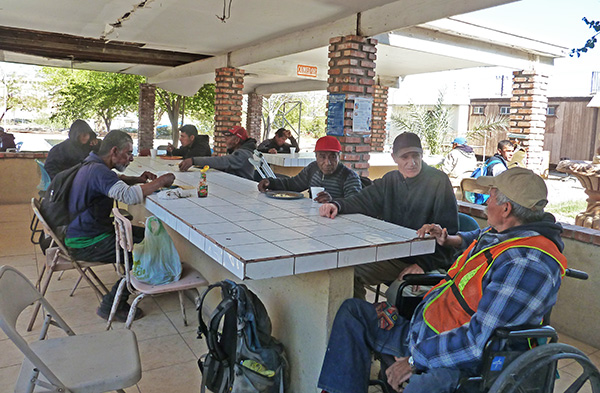
Rick (second from right) with migrants and other guests at the San José Obrero center in Mexicali.
Rick is now organizing three immersion-work groups for 2023 to help paint and recondition the Betania shelter in order to give overnight hospitality to migrants. He also helps serve meals at the center two afternoons a week and works preparing meals and serving at the San José Center four mornings a week.
His ministry also considers the violence against Internally Displaced Persons (IDPs). The Mexican states of Chihuahua, Sonora, Sinaloa, Guerrero, Michoacan, to name just a few, are infamous for violence and unemployment.
Rick is working with children, many from IDP families who are unable to provide adequate care for their kids. The children live Monday through Friday at the Oasis del Niño Center run by the Sacred Heart Sisters of Mexico (currently 17 children live there). The kids go to a public school, get three good meals a day, and live in a safe and healing environment (on weekends and holidays most children visit their families). Rick helps mentor kids, assisting them with homework and organizing recreational activities.
In the evenings and on Saturday mornings, Rick works at his local parish, Nuestra Señora de Guadalupe, where he is forming a library. A group of 60 kids preparing for the sacraments of first communion and confirmation visit the library to check out books as enrichment to their catechism classes. Rick also plans to share this library with the children at Oasis del Niño, which is only a short distance from the parish.
Rick reflects on what inspired him to return to mission and work with migrants:
In May 2021 I took a leave of absence from Maryknoll Lay Missioners to accompany my ailing mother and help my sister care for her. When my mother passed away in August 2021, I decided to take a “desert year” in the spirit of St. Charles de Foucauld.
I bought a 1998 Ford Ranger and a canvas Boy Scout tent — one I could stand up in — and headed out. My plan was to study the psalms in Hebrew, dispersed-camp in the solace of desert landscape, and take long hikes. What a joy it was to follow the phases of the moon, study the stars, and meditate on the psalms. I also reflected a lot on immigration as I camped in the Mojave and Sonora deserts along the U.S.-Mexico border.
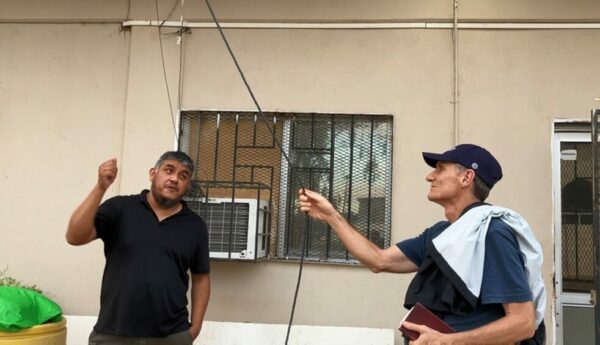
Father Juan Carlos Pineda Onofre shows Rick how to ring the bell at Our Lady of Guadalupe Parish.
At this very time, Luis, one of my library students in La Esperanza, texted me saying he had been threatened by a gang and had decided to leave El Salvador and immigrate to Virginia. He was in my prayers constantly during his trek north and when he finally made it to his sister’s place, I rejoiced with him over the phone.
During that conversation, he recounted his harrowing journey. Several times the border patrol had captured him and returned him to Mexico. On the fourth try, a border agent took him to the port of entry telling him to return to Mexico. Before releasing him, the agent threw him to the ground, stomach and face in the dirt, and rammed his knee between Luis’ shoulder blades, pressing hard and swearing that if he tried again, it would be worse.
From McAllen, Texas, to Houston, he traveled in the back of a tractor-trailer with blankets over him. A week after he arrived in Virginia, the world would hear the news of 53 people who died after being trapped in a sweltering tractor-trailer just outside San Antonio. Luis wept as he told me that could have easily been him.
Now here at the migrant center San José Obrero in Mexicali, a half dozen migrants from El Salvador arrive each day, and I often hear stories like Luis’. I miss El Salvador very much, yet it is a grace and joy to be able to serve a meal, offer a shower and make the life of Salvadorans and other migrants from around the world a little more humane, and help them on their way.

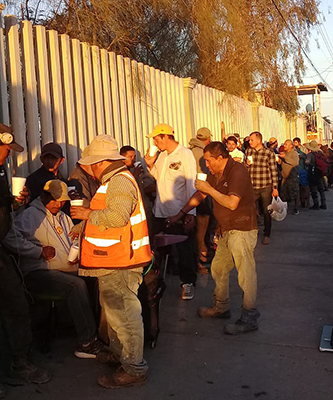

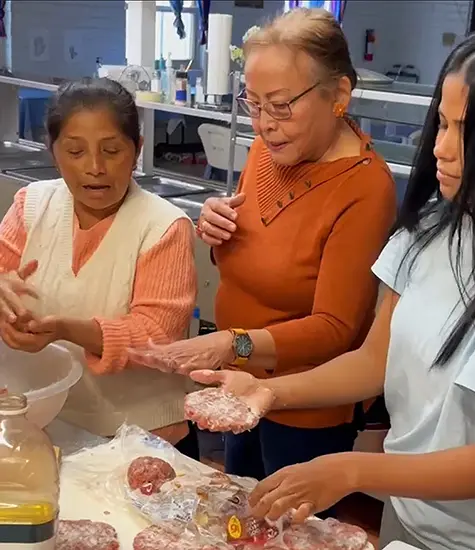
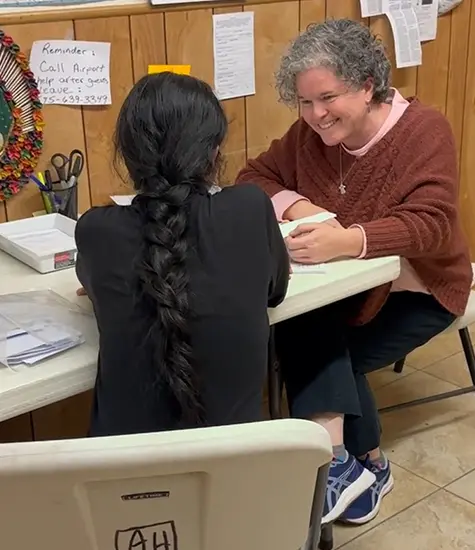
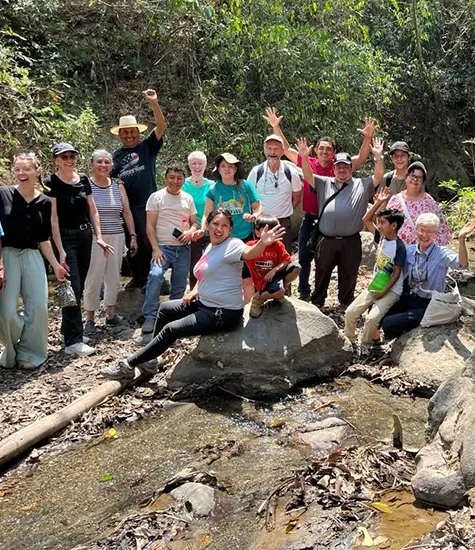




Congratulations Rick, great work. You are in my prayers.
Rick, it has been a privilege to accompany you from afar during your year of prayer in the desert during your leave from active ministry with the lay missioners.
It is great now to hear of your assignment in active ministry again in border ministry with migrants. Migration issues are continuing to grow as central concerns for both church and society, not just for the USA and Central and South American countries but in Africa and Asia and Europe, indeed throughout the world. Be assured of my prayers.
Felicidades! Thank you Rick and Elvira for making this good work a reality in Mexicali.
Hello Rick,
So good to hear you are active again with the Lay Missioners, in Mexicali. I remember you from our El Salvador mission immersion trip in 2016! I am really interested in hearing more about your work as it progresses. You are in my prayers.
Congratulations on developing this much needed program. I have been to the border on the Arizona side working with Sr Judy Burg through the school sisters of Notre Dame. I am part of the NE Ohio Maryknoll affiliate group. Several of us would be interested in being part of the immersion trips you are forming. Please let us know the dates and how to apply.
Saludos Rick!
What wonderful news to know of your new mission in Mexicali. Please know that you are always in my thoughts and I wish you joyful and fruitful experiences there working with the immigrant population. Many blessings to you. Please continue to send your stories so that I can share them with others!
Fran
Rick, so wonderful to hear of your new mission! You are a man of many good deeds. God has blessed you and you bless others! I was sad to hear about Luis’ harrowing journey. I am so relieved he is now safe. I am keeping both of you in my prayers.
Thank you for sharing. We are so grateful to know you and to learn about the work that you are doing. We loved meeting you in Sequim, but I do regret that we never got to do a hike together. Buena suerte hermano y que Dios te bendiga!